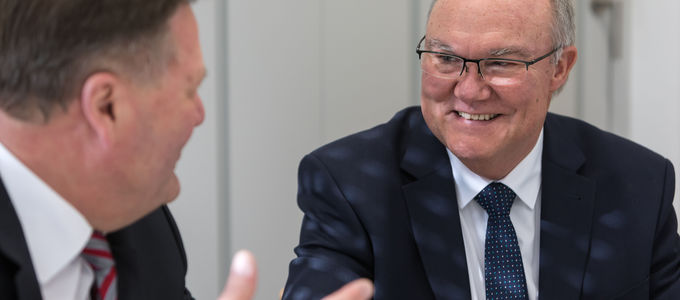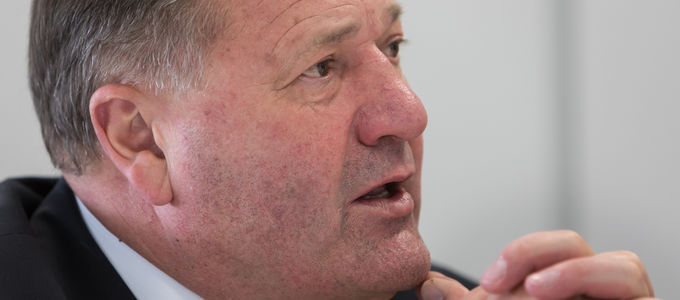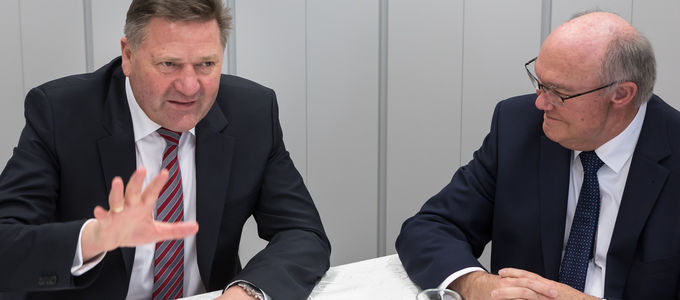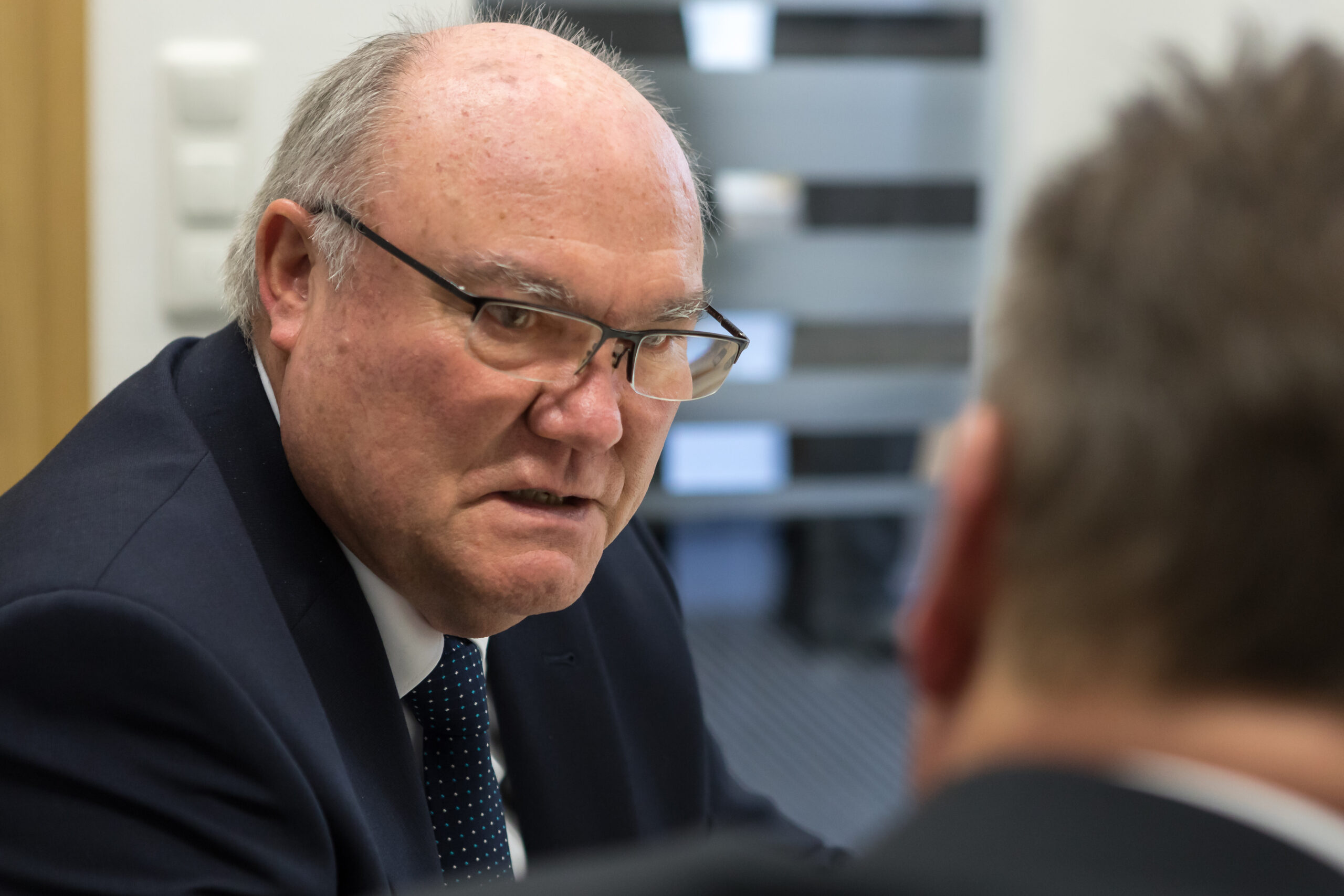
Outlook, review, insight: about one hundred days after the leadership change in the New Apostolic Church in the western part of Germany, the two District Apostles speak about cultural diversity, church mergers, and their private plans.
District Apostle Storck: “Together we can do it”, these were your words in a divine service in Dieburg (Germany), shortly before you were appointed as District Apostle of Western Germany. What can I as a simple member do to support you?
It is my deep conviction that you cannot do it on your own. Of course I have to fulfil my mission, I have to lead, but it is shared responsibility. The local church member supports me through his prayers, through goodwill, and by doing his share in the congregation.
Leading such a large District Church is a challenge. Where do you see the main focus of your work?
I see it as my task to put into practice what the Chief Apostle tells us and what comes from the District Apostle Meeting. Then we have to think about how we can implement this in the various territories. The methods used may be completely different. That is why I am grateful for support of the local brothers.
District Apostle Koberstein, when you look back over your time as a District Apostle, which developments do you consider as milestones?
I definitely see one milestone: the development of ecumenical relations. Much has grown closer together, and we are on a very good way. my impression is that the youth have become more active. That makes me really happy, as does the development among the brothers and sisters at the congregational level, who have taken over duties in the church which require no ministry. They contribute their gifts and qualifications.
How did you manage to respond to the many different cultural needs of the members in the various countries?
For me, the best key to all cultural differences is love. If you love the members, you will find a way to respond to the existing culture. When you truly love them you will also accept their otherness.
District Apostle Storck: I would like to add that you have to learn to listen. So many wrong decisions have been made because of poor judgement and because we did not listen long and hard enough. The biggest mistake you can make is to give the impression that you have preconceived ideas which you are not prepared to move away from. But if you proceed carefully and listen, you can make correct decisions on this basis. Listening and understanding are very important.
Let us talk about the merger of the two District Churches? What was the reason for this?
District Apostle Storck: One of the reasons is the demographic development. The other reason was addressed by the Chief Apostle during the divine service in Dieburg: he wants to lead the Church in a truly collaborative fashion manner, as a team, and says very openly: that is easier to do with fifteen or twelve District Apostles than with fifty.
District Apostle (ret.) Koberstein: The merger of the two district churches is a chance to combine strengths and achieve synergies—both administratively as well as pastorally.
District Apostle Storck: In administrative matters it is important that we use synergies. Why should we have separate departments both in Frankfurt and Dortmund for every administrative division even though the cities are only 220 kilometres apart? Keeping in mind our financial resources, this is a perfectly normal procedure.
The other point. Remember, already in the former District Churches the District Apostles did not take care of everything in the congregations themselves. In a congregation, the rector calls the shots; he looks after the congregation. The district rector looks after the district. The first person they contact is the Bishop or Apostle.
Is a merger in a region such as here in Germany more difficult than it would maybe be in Africa?
District Apostle (ret.) Koberstein: Such a process can be difficult for me as a District Apostle if I am full of my own importance. If I find my place, set the right priorities, and keep in mind the children of God who are entrusted to me, then the implementation of such a decision cannot be a problem. Problems may arise regarding specific issues of the merger, but these are things that can all be solved.
District Apostle Storck: Geographically, the working areas are expanding. However, the number of congregations and members per Apostle will not change. As far as the members are concerned, I see a challenge in the fact that some of the brothers and sisters have known the Apostle for a long time and others do not know him at all. These brothers and sisters will need special attention until everything is balanced once again.
In District Apostle Koberstein’s former district, elder districts were merged. Some of the members see these mergers to ever larger units rather critically.
If the membership in a district becomes too small, if there are not enough children or young people, it makes sense to merge districts. However, we need to be careful that the distances do not become too great. Mergers must never lead to the point where members are neglected. The members can rest assured that the district leaders, Apostles, and Bishops think long and hard before such decisions are made.
District Apostle Koberstein, what are your plans for your retirement?
Above all, I want to have time for my family, especially for my grandchildren. One of my hobbies is music. Up until now I have only promoted and encouraged it, but now I would like to actually make music again—instrumental for one, and I want to take singing lessons. Maybe I will even sit down and compose a few songs, as I used to way back when. I will be on the road with my two boys, who are singers, and maybe accompany them on the piano. We will see.
At your retirement you said that you hoped that people do not lose their passion for Christ. In your opinion, what are the dangers that threaten this passion?
Personal disappointments are one example. If we lose the ability to separate human things from what God does through Christ, it becomes dangerous. I really wish—and that is what I mean when I talk about passion for Christ—that we can keep our focus on the love of Christ and His activity. Then our enthusiasm will remain unchanged, our staying power will grow, and we will be able to handle certain disappointments without immediately giving up our faith in Jesus Christ at the first sign of a problem.
What do you wish each other?
District Apostle (ret.) Koberstein: My biggest wish is that my brothers and sisters love the new District Apostle as much as I felt their love for me. On a personal level, I wish the District Apostle God’s help and a high degree of inner peace bolstered by strong faith.
District Apostle Storck: I hope that we will continue to be in touch and see each other, and not lose sight of one another.




















